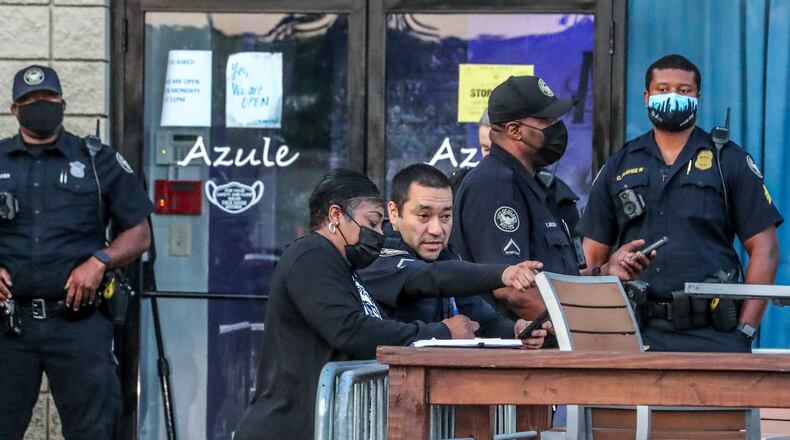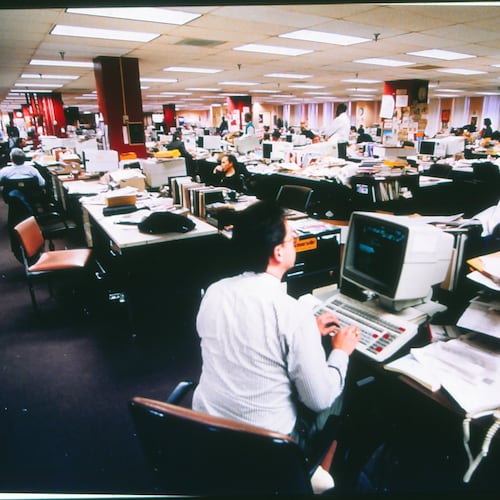Fear of crime is pushing the effort to create a city of Buckhead. And the brutalities of recent weeks have shifted that effort into overdrive.
Homeless man tries to rape teacher in broad daylight. Crazed gunman goes on shooting spree. Man killed at Intercontinental Hotel. Bystanders shot outside Home Depot.
Members of the Buckhead Exploratory Committee, the crew wishing to carve off their own city, want to raise $1.5 million to push their narrative. But the headlines above provide something money can’t buy — panic, humanity’s most primal motivator.
Laura Dobson, a longtime resident of Buckhead’s Peachtree Hills neighborhood, opposes the idea of fracturing off from Atlanta. “Everyone is frustrated. But it’s not the reason to build a fort. People think if we separate ourselves or insulate, we’ll be safe,” she said.
However, the cityhood movement is “picking up steam,” Dobson said. “It feels different this time. People are scared. Every time there’s an incident, it explodes on social media. (The cityhood crowd) is getting more credence than they had. If it gets to a vote it’ll be very close.”
The Buckhead Exploratory Committee is exploratory in name only. They’ve gone way past kicking the tires on the idea of seceding and are headlong into making sure there is a Buckhead City, population 90,000, by next year.
The story of the richest and whitest section of Atlanta wanting to separate from a majority African-American city — the Black mecca, if you will — has become a national and even international story, as issues of race, class and politics dominate news cycles these days.
If successful, the new city would pull away 20% of Atlanta’s population and about 40% of Atlanta’s assessed property value, according to an Atlanta Journal-Constitution analysis. About 74% of residents in Buckhead City would be white and 11% would be Black.
The template for secession was set in 2018 when GOP legislators voted to allow Eagles Landing, the tonier side of Stockbridge, to hold a referendum to split off and create a city. The residents of the potential city said they wanted self-determination. They avoided noting that Stockbridge had recently installed its first Black mayor, as well as a fully African American city council. The effort lost in a referendum.
At the time, I wrote this was a terrible path to navigate and predicted that some day, disgruntled Buckhead residents would entertain the idea.
Well, that day is now. And it threatens to put a dagger in the back of Atlanta.
Bill White, a New Yorker until three years ago, heads the effort. He’s a fundraiser by vocation and comes across in staccato waves of verbiage like he’s trying to sell you the Brooklyn Bridge — in a hurry.
White acknowledges that the recent crime wave has aided his cause. Or at least has given Buckhead residents a place to park their fears.
“I hate to say the timing couldn’t be better, because it’s so bad,” he told me in an interview this week. “I say we’re living in a war zone. If you go for a Saturday morning jog and get two bullets in your abdomen, it just seems so random.”
He then cites a litany of break-ins, robberies, carjackings and shootings, adding that women no longer feel safe pumping gas and residents worry about whether to take a walk.
Those are certainly concerns that residents in other parts of Atlanta have had for decades. Crime in the Atlanta Police Department’s Zone 2 (which is largely Buckhead) is up overall by a third this year. But compared to the APD’s other five zones, it has the least number of robberies, aggravated assaults and shooting incidents this year. And only Zone 5 (Midtown) has fewer murders. Buckhead is second in stolen cars.
Yet those other communities, while they have endured more crimes, haven’t the means nor the wherewithal to threaten to take their toys and split.
“Everyone is frustrated. But it's not the reason to build a fort. People think if we separate ourselves or insulate, we'll be safe."
White dismisses the notion that Buckhead’s cityhood effort has anything to do with race. “The only thing white about this is my last name,” he said.
“We don’t want to walk away from Atlanta. We love Atlanta! The city of Atlanta has exploited the great people of Buckhead. Atlanta will have to live on a budget. Wooo!” he added sarcastically. “They’re afraid that they’ll have to do that. They never had to.”
He speaks in cascades: “We’re going to take the handcuffs off the police and let them do their jobs.” … “Impound (street racers’) cars and that’ll be the end of it.” … “We love Atlanta. We want to help the people of Atlanta. But not these corrupt politicians.” … “There’s not a thing that we haven’t studied with the top experts. We’re like 10 steps ahead.”
White sprinkles sentences with extra helpings of adjectives — great! fantastic! wonderful! — and sometimes is not hemmed in by accuracy: “Murders are up 170% in Buckhead.” (The latest figures for Zone 2 say murders have increased from five at this time last year to seven this year, a 40% increase.)
If White sounds like another famous ex-New Yorker, that might not be a coincidence. He was a big Hillary Clinton supporter until election night 2016, when she lost. Then he drove over to the party at Donald Trump’s headquarters and never looked back, becoming tight with the Trump family and a big-time fundraiser for The Donald, according to The New York Times.
Speaking for the other side is former Republican state House Majority Whip Ed Lindsey, who sounds more like the public policy lawyer he is. He said unravelling Buckhead from Atlanta with all the issues of public debt, employee pensions, schools and other governmental concerns would be onerous.
“The differences between creating a new city (like Sandy Springs in northern Fulton County) and carving up an existing city are like comparing third-grade math and calculus,” he said.
Lindsey said current crime levels are “unacceptable” in all areas of the city. He said the upcoming election for a new Atlanta mayor and several new council members is a time for residents to press the candidates to come up with solutions.
Both sides of the Buckhead debate argue that city officials have not been attentive to their concerns. APD Chief Rodney Bryant this week offered up a reshuffling of the department in reaction to the crime wave, an issue that threatens to blot out all others this year.
Volkan Topalli was one of the three Home Depot shoppers struck by stray bullets during a gun battle last month. He was hit walking out of the garden area. He also is a criminologist at Georgia State University who studies urban violence and “offender decision-making.” (They tend to make bad and harmful choices.)
Credit: Channel 2 Action News
Credit: Channel 2 Action News
Gutting Atlanta’s tax base, he said, “will have a devastating effect on the city, same as white flight did.”
And weakening Atlanta’s Police Department will hurt other areas, not just Atlanta, Topalli said.
“You’re competing for resources in a nonstrategic way. Crime is not perfectly localized because we have freedom of movement,” Topalli said. “Crime needs to be controlled outside Buckhead. If you cut the tax base (of Atlanta), you’ll end up increasing (Buckhead’s) vulnerability, not decreasing it.”
I asked about the “good neighbor” arguments that denigrate richer areas for leaving poorer areas behind, even worse off than before. He batted that one away.
“I think we need to appeal to their sense of self-preservation,” he said.
He’s right, because selfishness is right up there with fear.
About the Author
Keep Reading
The Latest
Featured




